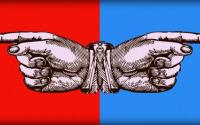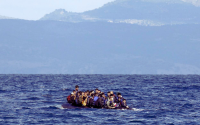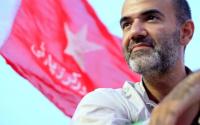Al-Ahram Weekly Online, 27 Sep. - 3 Oct. 2001, Issue No.553
Who notices Filipino maids? From magnificent, temporarily devastated, New York, through grand, chaotic old Cairo and all the way to that supreme success story of capitalist globalisation, Hong Kong, they're everywhere and nowhere: grey, shadowy appendages to upper-middle class families of all religious persuasions, barely seen and almost never heard.
On the grounds of the Kingsmead cricket stadium in Durban, South Africa, a mere three weeks ago, I listened as a Filipino house-worker addressed a couple of hundred women and men of the most diverse "features and complexions," including the dreaded Middle Eastern variant. It was the first time she had attended an international gathering of any kind, she told us, yet she spoke with force and eloquence -- and we listened as she unfolded the story of the modern trade in human beings, courtesy of the global marketplace.
The market, and its manifold great and little helpers -- states and legislators, military and police, international financial organisations and giant multinational corporations and the hosts of middlemen making a buck in the thousands of nooks and crannies of the world capitalist system -- had seen to it that she was uprooted from her home, family and friends and driven to Hong Kong, where she was currently a house worker. But this was no "victim" providing testimony of her misery; her personal story was stated briefly and dispassionately, as others might introduce themselves as Dr So-and-So, from this or that university, indicating their qualification to deal with the subject at hand. She addressed us as a political activist, and as a political activist she not only spoke of the misery and suffering of "migrant labour," but also of the Dalits and Palestine, colonialism and the old and new traffic in human beings.
Now I'm by no means a romantic where the masses are concerned. "The people" can be -- and often are (even in the Philippines, we have the hoodlums of the Abu Sayyaf group) -- as stupid, bigoted and narrow- minded as their rulers, and as the multitudinous public-opinion-makers who make a good living out of telling "the people" what to believe. But this Filipino house-worker, like so many others gathered in Durban, was not just a member of the people. These, at any rate, were not victims seeking redress or retribution. They were people on the move: organising, achieving knowledge of themselves and of the world, making common cause with others suffering from both similar and distinct forms of oppression and injustice, but united in the resolve to fight for a better, more just world. These were people who, against all odds, were bent on winning.
There were no human bombs in Durban -- airborne, on wheels or on foot -- yet all hell broke loose. The US, Israel and the oh-so- moderate Europeans were all yelling and screeching. The Western media was in a frenzy of disdain. The UN dumped its empowerment and human rights rhetoric in the nearest rubbish bin and, in the voice of none other than Human Rights High Commissioner Mary Robinson, told the erstwhile "marginalised, powerless and voiceless" that democracy had very strict limitations: the final declaration on which they had voted overwhelmingly would simply be banned.
The murderous attacks of 11 September followed shortly after. There is no simple cause and effect relationship here (the people at the NGO Forum in Durban and those who were planning and executing the transformation of civil airplanes into human missiles are as different as night and day). There is, however, the dramatic coincidence of two diametrically opposite paths of resistance being expressed in resonant and highly visible ways within a very short span of time.
The War of the Races is upon us, and Durban may go down in history as a final cry of reason -- one last lost opportunity -- before humanity hurled itself towards brutal mutual and self-destruction. It may not. The sheer madness expressed in both the 11 September outrage and Bush's determination to "end states" in a long and "monumental battle of good against evil" may eventually nudge enough people throughout the world to reject the American president's dictum ("Either you are with us, or you are with terrorism"); to look towards, and help elaborate a different path.
The struggle is about politics; it's about political space; and, ultimately, it's about democracy. Ideology in the absence of politics is an affirmation of the sway of stupidity, tribalism and bigotry -- and authoritarianism, both secular and religious. The political is the realm of self-determination and, as such, it is the preeminent space of social practice -- it is only there that monumental rubbish of the sort piled on high by the likes of Bush and Bin Laden may be trashed (in global- environment-friendly ways).
It is a battle of the post-modern against the pre-modern, pundits and political leaders in the West are telling us, revealing just how skin-deep is liberal political correctness (scratch hard enough, it seems, and an East India Company Pukka Sahib is revealed).
As it happens, Bin Laden is as dernier cri as Tony Blair. They merely express two sides of the true meaning of globalisation -- the destruction of the political.
The political may yet fight back.






